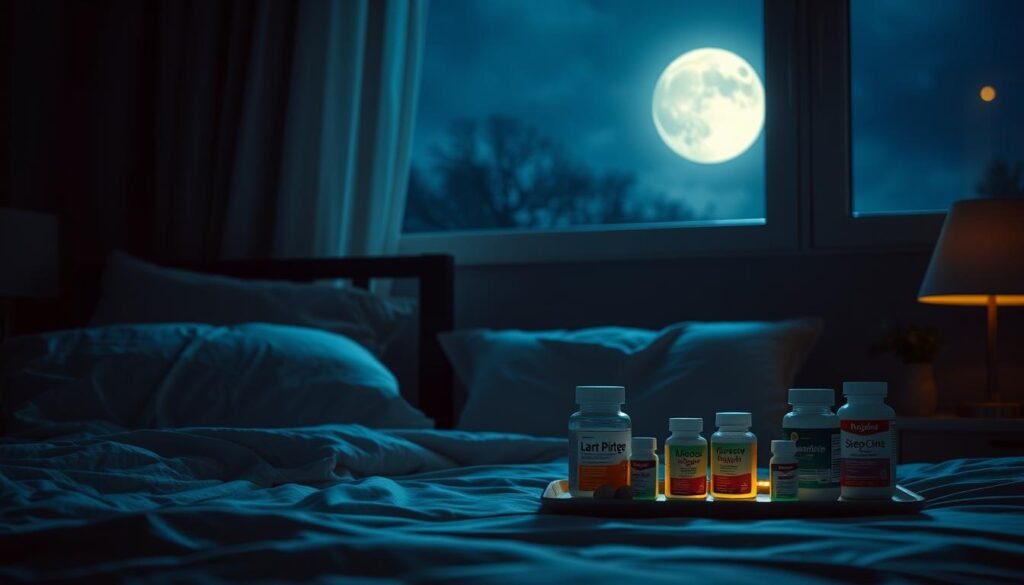Did you know about 50 to 70 million people in the U.S. can’t sleep well? That’s a lot of adults who struggle every night. There’s a big need for effective sleep aids, from prescriptions to over-the-counter options. Getting enough sleep is key for good health. Yet, many can’t find peace at night. Knowing the options for treating insomnia helps people choose the best for their sleep health.
This article looks at different ways to fight insomnia. We’ll talk about prescription drugs like benzodiazepines and newer treatments. Plus, we’ll cover over-the-counter options. You’ll get a good look at what’s available to tackle sleep problems. Since not every remedy works for everyone, it’s important to know the choices. For those digging deeper, detailed studies and info on insomnia treatments are found here.
Key Takeaways
- Insomnia affects about 50 to 70 million Americans, emphasizing the need for effective treatments.
- Prescription sleep medications and over-the-counter remedies both play significant roles in managing insomnia.
- Many common sleep aids come with side effects that should be carefully considered before use.
- Alternative therapies and lifestyle changes can complement medicinal approaches for better sleep outcomes.
- Seeking professional guidance is crucial for persistent or treatment-resistant insomnia.
Understanding Insomnia and Its Impact
Insomnia is a problem where people can’t sleep well. It affects around 70 million Americans every year. This condition includes different sleep troubles. It has many effects of insomnia on health and daily activities. People with insomnia often feel more anxious, think less clearly, and have a higher risk of getting sick.
The effects of insomnia are more than just feeling tired. They harm our emotional and physical state. Those facing insomnia might feel stressed and find focusing hard. This makes doing daily tasks tough. Not sleeping enough can make people feel down and lower their life quality.
Insomnia mainly affects older adults and women more. This situation shows we need to pay more attention to this disorder. To deal with insomnia, lifestyle changes and treatments are vital. Options like medications and therapies are customized for each person’s needs.
There are treatments like sleep pills and other medicines that help with sleep issues. Cognitive behavioral therapy (CBT) is also powerful. It improves sleep by dealing with mental health issues causing insomnia. Understanding all factors involved lets people find the best way to improve their sleep.
| Insomnia Impact | Symptoms | Potential Solutions |
|---|---|---|
| Emotional Distress | Anxiety, Depression | Cognitive Behavioral Therapy (CBT) |
| Physical Health Decline | Fatigue, Weakened Immune System | Medication, Lifestyle Changes |
| Cognitive Impairment | Poor Concentration, Memory Issues | Mental Healthcare, Support Groups |
Common Types of Medications for Insomnia
There are many medications for insomnia. This part looks at both prescription and over-the-counter options. These include their uses and risks. It’s important to talk with doctors to use them safely.
Prescription Sleep Medications
Doctors often suggest prescription medicines for short-term insomnia help. Here are some popular ones:
- Daridorexant (Quviviq) and Doxepin (Silenor) are good for falling asleep.
- Eszopiclone (Lunesta), Zaleplon (Sonata), and Zolpidem (Ambien, Edluar, Zolpimist) help you stay asleep.
- Medicines like Temazepam (Restoril) and Suvorexant (Belsomra) are useful but carry a risk of dependence.
- Triazolam (Halcion) stands out because it aids both in falling and staying asleep without causing dependence.
Using these medicines can lead to side effects such as dizziness and headaches. Older adults and pregnant women need to be extra careful. Always follow the guidelines to avoid dependence and get the best results.
Over-the-Counter Sleep Remedies
For mild insomnia, over-the-counter remedies are available. They mainly include:
- Diphenhydramine — found in allergy meds.
- Doxylamine — in cold meds.
These may help some people but not everyone. Always consult a healthcare provider before trying them. Mixing these with prescription drugs can be risky.
| Medication Type | Examples | Function | Dependence Potential |
|---|---|---|---|
| Prescription | Daridorexant, Doxepin, Zolpidem | Helps fall/stay asleep | Yes (some) |
| Over-the-Counter | Diphenhydramine, Doxylamine | Mild sleep aid | Low |
Choosing the right medicine requires knowing your health history. Work with your doctor to find the best option.
Top Prescription Sleep Medications
There are many choices for prescription sleep meds, each working in different ways. Knowing them helps you make good choices for your sleep health. Let’s look at three popular ones: Doxepin, Temazepam, and Zolpidem.
Doxepin (Silenor)
Doxepin is sold as Silenor. It’s mainly an antihistamine that helps with sleep. It’s good for use up to three months. But, it can cause side effects like dry mouth, constipation, and headaches. It’s especially important for older adults or those with certain health issues to talk to doctors before trying Doxepin.
Temazepam (Restoril)
Temazepam, or Restoril, is a benzodiazepine used for short stints to beat insomnia. It helps you fall asleep faster. Yet, there’s a risk of becoming dependent on it. Side effects include feeling dizzy, being drowsy during the day, and possibly having worse insomnia after stopping it. It’s vital to follow your doctor’s advice closely with Temazepam.
Zolpidem (Ambien)
Zolpidem, known as Ambien, works fast to help you sleep. However, it may cause unusual sleep actions like sleepwalking. Doctors usually say to only use it for a short time because of possible harm to thinking skills with long-term use. It’s key to understand how Zolpidem works and its risks.
Top Over-the-Counter Sleep Remedies
Many people turn to over-the-counter sleep aids to help with insomnia. These products are easier to get than prescription drugs. Diphenhydramine and Doxylamine are popular because they make you sleepy. Knowing how they work can help you choose wisely for better sleep.
Diphenhydramine
Diphenhydramine is a well-known sleep aid found in products like Benadryl. It usually comes in 25 mg tablets. The FDA warns it may make you drowsy the next day, affecting things like driving. Most adults take 1–2 tablets every 4–6 hours for sleep.
This medication can help you fall asleep but shouldn’t be used for a long time. It might stop working well after awhile. Side effects include dry mouth, constipation, and trouble urinating.
Doxylamine
Doxylamine is another antihistamine used for sleep, found in Unisom. It works much like Diphenhydramine to help you sleep. Before taking it, think about any health issues you have as it can cause dizziness and other side effects. You should not drink alcohol with it because it increases sleepiness.
It is especially important for those over 65 to use caution, as side effects can be stronger.
| Medication | Active Ingredient | Dosage | Possible Side Effects |
|---|---|---|---|
| Diphenhydramine | Diphenhydramine HCl | 1–2 tablets (25 mg each) every 4–6 hours | Next-day drowsiness, dry mouth, constipation |
| Doxylamine | Doxylamine Succinate | Varies by product, follow instructions | Dizziness, daytime drowsiness, urinary retention |
Over-the-counter sleep aids like Diphenhydramine and Doxylamine can help with insomnia for a short time. Be sure to know how they might react with other medicines and your health conditions. Always talk to a healthcare professional if you have doubts or concerns about using them.
Natural Sleep Supplements to Consider
Looking for natural ways to sleep better? Many people are. Supplements like Melatonin and Valerian Root can help. They’re popular among those trying to find natural solutions for sleep problems.
Melatonin
Melatonin is a hormone that helps control your sleep cycle. Studies show it can help with sleep issues like jet lag and insomnia. It’s useful for starting sleep.
It’s seen as safe, but we don’t know about using it for a long time. Still, many adults in the U.S. have tried it for sleep troubles.
Valerian Root
Valerian Root is a well-known herb. It’s been used for ages. It might improve sleep by increasing GABA levels which calms the brain.
Many people say it helps them sleep better. But it’s smart to talk to a doctor before trying it out.
| Supplement | Primary Benefit | Recommended Usage |
|---|---|---|
| Melatonin | Regulates sleep-wake cycle | 1-5 mg 30 minutes before bedtime |
| Valerian Root | Improves sleep quality | 300-600 mg up to 1 hour prior to sleep |
| Glycine | Enhances sleep quality | 1-3 grams before bedtime |
| Magnesium | Promotes relaxation | 200-400 mg in the evening |
| 5-HTP | Supports melatonin production | 100-300 mg before sleep |
Trying out natural sleep aids like Melatonin and Valerian Root might help you sleep better. Remember, what works varies from person to person. Always think about getting advice from a healthcare professional to improve your sleep safely.
Understanding Side Effects of Sleep Medications
Sleep medications help with insomnia but have potential side effects. It’s vital to know these side effects if you’re considering them. Always watch how your body reacts to ensure your safety.
Common Side Effects
Common side effects include:
- Drowsiness
- Dizziness
- Mental slowing
- Unusual dreams
- Daytime sleepiness
- Headaches
- Nausea and upset stomach
- Memory problems
Benzodiazepines, like Ativan, Librium, and Xanax, come with health risks. They can be addictive. Older adults might face more falls and confusion. The hangover effect can also hurt daily activities like driving due to ongoing drowsiness.
Risks of Dependency and Abuse
Prolonged use of sleep medications can lead to dependency and abuse. Drugs such as Ambien and Lunesta may cause less habit-forming risks but can still lead to physical dependence. There’s a particular worry with older drugs like barbiturates, which might cause deadly overdoses. It’s important to talk to a doctor about safe use and other options if you’re considering benzodiazepines.
Mixing these medications with opioids or alcohol can be especially dangerous for young people. Look out for severe drowsiness, allergic reactions, or engaging in activities while asleep. Remember, it’s crucial to use sleep medications carefully and under a doctor’s watch.

| Medication Type | Common Side Effects | Risks of Dependency |
|---|---|---|
| Benzodiazepines | Drowsiness, dizziness, mental impairment | High |
| Barbiturates | Confusion, respiratory depression | Very high, potential fatal overdose |
| Non-Benzodiazepines | Drowsiness, headache, nausea | Moderate to high |
| Melatonin | Daytime drowsiness, vivid dreams | Low |
Alternatives to Sleep Medications
There’s no need to always turn to sleep meds for insomnia. There are effective other ways to get good sleep. Through changes in behavior and optimizing your sleep environment, better sleep is possible.
Cognitive Behavioral Therapy for Insomnia (CBT-I)
CBT-I tackles sleep issues by addressing psychological triggers. It mixes several techniques aimed at adjusting sleep-related thoughts and actions. With cognitive restructuring, it challenges negative sleep thoughts. Meanwhile, behavior changes help create consistent sleep routines. CBT-I offers a lasting fix for those battling insomnia.
Sleep Hygiene Tips
Better sleep hygiene is key to avoiding sleep meds. It involves actions that make good sleep easier to achieve. Here are tips to improve your sleep hygiene:
- Maintain a regular sleep schedule by going to bed and waking up at the same time daily.
- Create a comfortable sleep environment, ensuring the room is dark, quiet, and at a cozy temperature of 65 to 72 degrees Fahrenheit.
- Limit exposure to screens and artificial light before bedtime to help facilitate the natural release of melatonin.
- Engage in calming pre-sleep activities such as reading or meditating to prepare the body for sleep.
- Avoid consuming too much caffeine and big meals before sleeping, as they can affect sleep.
CBT-I and proper sleep hygiene are great alternatives to sleep meds. By adjusting both minds and surrounds, you can greatly better your sleep. This will reduce your need for sleep drugs.
Managing Insomnia Effectively
To handle insomnia, it’s important to look at all possible reasons. This includes stress, health issues, and mind-related problems. By knowing what causes your sleep issues, you can get back to sleeping well again. It’s key to figure out these causes, as fixing them can make your sleep and life better.
Assessing Underlying Causes
If you can’t sleep, you should check your health and how you live. Insomnia often comes from:
- Chronic stress and anxiety
- Depression and mood disorders
- Medical conditions such as heart disease or arthritis
- Certain medications and their side effects
Finding and solving these problems helps in dealing with sleep issues. This leads to a better sleep setup.
Lifestyle Changes to Promote Better Sleep
Making changes in your life is also key for better sleep. Here are some things that can help:
- Keeping a steady sleep routine
- Staying away from big meals, caffeine, and alcohol before bed
- Working out regularly, about 3-4 times a week
- Trying relaxation methods like meditation or yoga
- Having a comfy place to sleep
These adjustments not only help you sleep better but boost your overall health too. They can make a big difference in fighting insomnia and bringing peaceful sleep.

When to Talk to a Doctor About Sleep Medications
It’s important to seek help when sleepless nights become a regular thing. Seeing a doctor for insomnia should be high on your list if sleep troubles don’t go away. Talking about sleep meds and their risks is key during these visits.
Consultation for Unresolved Insomnia
If you’re tossing and turning more than once a week, it’s time for help. Not sleeping enough can make you feel tired, grumpy, and could lead to feeling really down. It can even mess with your heart and weight. The National Sleep Foundation says getting 7 to 9 hours of sleep each night is a must.
So, if you can’t sleep well, seeing a doctor is crucial.
Medication Interactions and Risks
Knowing the risks of sleep meds is important. Mixing them with other drugs can be bad news. Always tell your doctor about all the meds and vitamins you take, to stay safe. Some sleep meds have side effects, and aren’t right for everyone.
Top Medications for Insomnia: Summary of Options
Medication choices for insomnia are quite varied among people. It’s crucial to understand the summary of sleep medications out there. This helps in making smart decisions. Different treatments come with their benefits and possible side effects. These factors need considering when choosing insomnia medications.
Choosing the Right Medication for You
When picking a medication, patients should consider their own needs against what each medication offers. Let’s look at a clear comparison of popular sleep medications:
| Medication Name | Type | Common Dosage | Potential Risks |
|---|---|---|---|
| Doxepin (Silenor) | Antidepressant | 3-6 mg | Next-day sedation |
| Temazepam (Restoril) | Benzodiazepine | 7.5-30 mg | Dependency risk |
| Zolpidem (Ambien) | Z-drug | 5-12.5 mg | Memory problems, dizziness |
| Triazolam (Halcion) | Benzodiazepine | 0.125-0.25 mg | Short-term use recommended |
| Trazodone | Antidepressant | 25-100 mg | Drowsiness, dizziness |
| Melatonin | Hormonal supplement | 0.5-5 mg | Daytime drowsiness |
Talking with doctors helps when checking your health state, especially for ongoing insomnia. This issue impacts around 50 to 70 million people in the US. How well medications work depends on each person’s health background and any other existing conditions. Plus, using other methods like sleep hygiene practices and cognitive therapy can boost your treatment plan.

Conclusion
Insomnia is a big problem, affecting 50 to 70 million adults in the USA. Many treatments exist, from pills to natural options. It’s key to know how sleep meds and other methods like CBT can help beat insomnia.
Medications offer quick relief but may lead to side effects and dependence. On the other hand, CBT shows lasting results without harmful side effects. Adding sleep hygiene and behavior therapy can greatly improve life for those with chronic insomnia, impacting around 10% of adults.
Getting good sleep might take time and help from experts, but it’s worth it. By trying different treatments and knowing what they involve, people can find effective ways to tackle insomnia. There’s hope and support out there, promising better sleep and brighter days ahead.